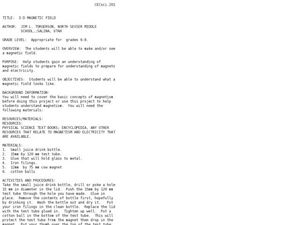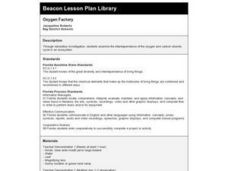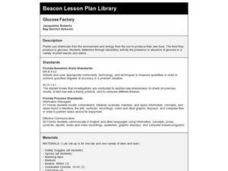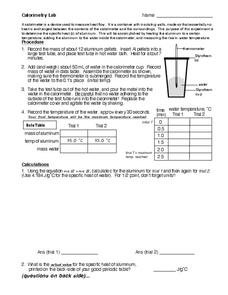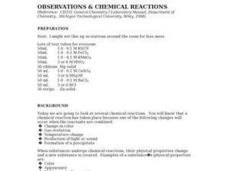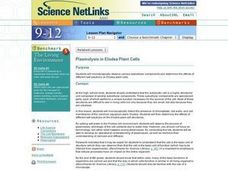Curated OER
Observing the Effect of a Change in Conditions on a System at Equilibrium by Applying Le Chatelier's Principle
High schoolers describe the Le Chatelier Principle. They participate in an experiment in which they observe the changes in an equilibrium system. They answer discussion questions to end the lesson.
Curated OER
3-D Magnetic Field
Students create a magnetic field. In this investigative lesson students design their own magnetic field so that they can see how magnetism and electricity work.
Curated OER
The Synthesis of Some Organic Compounds And Their Representative Structures
Students examine how to represent organic compounds three-dimensionally. They write a synthesis reaction for three demonstrations, and construct a three-dimensional structure using a molecular modeling set.
Curated OER
More on Temperature and Solubility
High schoolers discover how temperature effects the solubility of solutes by experimenting with a range of temperatures. They develop skills for observing, inferring, measuring, comparing and contrasting.
Curated OER
Insulators, Conductors, and Energy Transfer
Third graders conduct experiments to determine what types of material make good insulators. They prepare a graph of time vs. temperature for their sample. They choose a graph using each kind of material to display for class analysis and...
Curated OER
Oxygen Factory
Fourth graders examine the interdependence of the oxygen and carbon dioxide cycle in an ecosystem through a laboratory investigation. After a lecture/demo, 4th graders complete the lab in groups.
Curated OER
Leaf Straw
Learners investigate plant structure and the process of photosynthesis. Using everyday items, they demonstrate that the leaves and stems of plants can act like a straw. In addition, they identify plant structure.
Curated OER
DETERMINING THE CONCENTRATION OF A SOLUTION: BEER'S LAW
Young scholars determine the concentration of an unknown nickel (II) sulfate solution by using the colorimeter.
Curated OER
An alternative Temperature Measurement
Students will observe an alternative method of temperature measurement. In this scientific measurement lesson, students observe and discuss alternative systems used to measure temperature.
Curated OER
THE LOST CHROMATOGRAPHY LESSON
Students complete a chromatography experiment, In this chromatography lesson, students complete an experiment similar to one that was to be carried out on the Challenger that exploded. They examine ink spots as the wick on filter paper....
Curated OER
Great Gravity, Batman!
Eleventh graders are introduced to the effect of gravity on plant growth. They describe the major processes and mechanisms by which plants grow, develop, and supply various products, including energy and nutrition, needed by other...
Curated OER
Glucose Factory
Fourth graders determine, through laboratory activity, the presence or absence of glucose in a variety of plant leaves and stems. They work in groups and perform a three part laboratory which shows them how plants convert sunlighht to food.
Curated OER
Down the Drain
Young scholars explore what problems might occur if oxygen decreases in a body of water. They model what happens in a situation where decomposition is occurring. Students obtain, organize, graph, and interpret information. They i...
Curated OER
Calorimetry Lab
In this calorimetry lab, students apply the information read about a calorimeter to conduct a scientific investigation. Students record their data in a chart. Students use the information from the chart to calculate specific heat of...
Curated OER
Combining Elements to Form a Compound
Students explore elements and compounds. For this lesson about elements and compounds, students will do an experiment. Students work in groups of 2-3 as they complete two separate activities. Students understand how two elements combine...
Curated OER
Rainbow Electrophoresis
Students are introduced to the principles of gel electrophoresis and also provides an opportunity for students to practice loading gels and prpetting. In this laboratory activity, food color is used to separate into constituent pigments.
Curated OER
Feeling Pressured
Students explore pressure in our atmosphere. They examine the relationship between pressure and depth. Students construct an experimental apparatus and take measurements. Students evaluate the impact of pressure on the lungs.
Curated OER
Bubonic Plague
Students study the history of the causes and spread of the Bubonic Plague. They determine what groups of people were affected by the disease and locate the geographic areas they resided in. Working in small groups they conduct a an...
Curated OER
Exothermic and Endothermic Changes
Students define and identify endothermic/exothermic reactions. Using a series of experiments, they construct and interpret potential energy diagrams for their reactions.
Curated OER
Observations & Chemical Reactions
Young scholars conduct a series of experiments in which they explore chemical reactions. They detect chemical changes by observing how physical properties change when two different chemicals are combined. They list and describe the...
Curated OER
Plasmolysis in Elodea Plant Cells
Young scholars microscopically observe various subcellular components. They determine the effects of different salt solutions on Elodea plant cells. Students explain the major function of a cell membrane and describe its structure.
Curated OER
Chemical Magic
Students identify acids and bases. In this chemistry lesson plan, students use red cabbage juice as an indicator of whether the liquid is an acid or base. Students discuss the results.
Curated OER
Quake Clues
Students study earthquakes and how sediment accumulations are used for past information on earthquakes. In this earthquake lesson students interpret sediment cores and describe turbidites.
Curated OER
The Hijacker - How a Virus Spreads
Students view a video that presents how viruses attack the body and how the body's immune system responds. They simulate the spread of an infectious disease and establish the identity of the original carrier.

